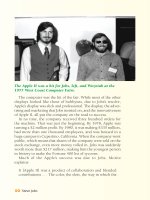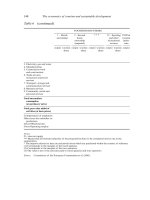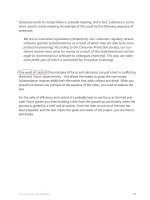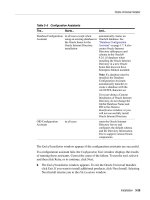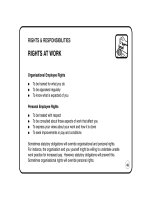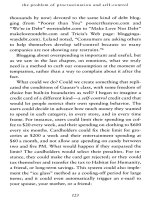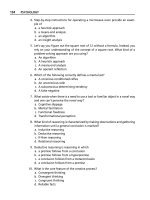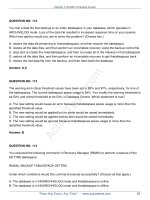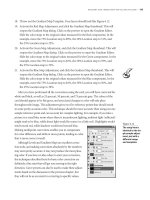Beat the Street II: I-Banking Interview Practice Guide phần 6 ppsx
Bạn đang xem bản rút gọn của tài liệu. Xem và tải ngay bản đầy đủ của tài liệu tại đây (286.7 KB, 10 trang )
44
WETFEET INSIDER GUIDE
Beat the Street II: I-Banking Interview Practice Guide
rulES OF ThE rOaD
aT a glaNcE
INTErvIEW
rOaDmaP
POPular
DESTINaTIONS
hITTINg ThE rOaD:
16 QuESTIONS
FINDINg yOur Way:
16 aNSWErS
aSkINg FOr
DIrEcTIONS
work fits into the historical and social context of the
time in which it was written.
is candidate starts off strong in the sense that she
manages to convey an important message about herself
even discussing something as innocuous and seemingly
irrelevant to banking as her major: We already know
that she’s probably a detail-oriented person (at least her
response suggests that), and she’s emphasizing that she’s
capable of doing a lot of work to a high standard in a
short period with an eye for both detail and big-picture
issues.
e message here? If your major seems unrelated to
investment banking, try to highlight ways that it might be
more related than the interviewer would think. ere are
no unimportant questions in banking interviews. Each
one offers you the opportunity to convey an important
message about yourself.
Our only quibble: About halfway through her
response, she trails from the question she was asked. (She
was asked why she chose her field of study, not what she
learned from it.) Even in self-awareness questions, don’t
take too many liberties.
Economics, on the other hand, was another story.
I took Economics 101 as a freshman in college and
came very close to failing the first mid-term. I know
for sure that I failed the first quiz. e thing about
Economics for those who are studying it for the first
time is that it’s not only an entirely new language, but
an entirely new way of thinking about things. It took a
while before it all clicked, but once it did, I found that
I really loved it. Economics gives a framework for just
about everything—if you really break it down, it’s the
science of decision-making. I took another class the
next semester and then another after that, and before I
knew it, I had taken enough classes to declare another
major.
Interviewer: So how long did it take before it all
“clicked”—what did you get in your introductory
Economics class?
Interviewers will often ask for your grades in specific
classes (and they may have a copy of your transcript in
front of them, so don’t fudge your answers).
Candidate: In the end, I got an A. at first
midterm was the lowest grade I had ever gotten, and I
just wasn’t willing to accept that. In retrospect, I guess
I just became fiercely determined not to get a C in
Economics, no matter how difficult I initially found
the material. In that course, your final grade would
either be the average of your midterm and final, or just
your grade on the comprehensive final (whichever was
higher). I knocked myself out between the midterm
and the final and got an A.
Again, this candidate proves that every question can
provide an opportunity to highlight things about your
background that will be highly relevant to a career in
banking. Let’s remember some of the things that we
discussed in the capacity category: high performance
standards, ability to learn quickly and work efficiently,
and the capacity for continuous learning and
improvement. is candidate’s anecdote about her near-
miss with economics suggests that she has exhibited these
three traits in the past.
Interviewer: Well, by looking at your transcript, it
seems as though you’ve done impressive work in your
Economics classes. But quite frankly, a lot of these
courses look pretty theoretical—I’m not seeing a lot of
academic work in finance or accounting. Why do you
think we should hire you, as opposed to someone from
Wharton with a more quantitative background?
Candidate: I think that the Economics classes that
I’ve taken have represented a balance of theoretical
and applied—and even the theoretical classes
involved a ton of problem sets and (perhaps more
importantly) a thorough understanding of the
quantitative theory driving economic decision-
making. I actually found the theoretical classes
more challenging—in applied classes such as
statistics, you really just learn formulae and learn
to plug in numbers. In a theoretical Economics
classes, you’re doing a lot of proofs and a lot of
calculus and you have to genuinely understand the
quantitative relationships driving, say, the shape of
an indifference curve.
45
WETFEET INSIDER GUIDE
rulES OF ThE rOaD
aT a glaNcE
INTErvIEW
rOaDmaP
POPular
DESTINaTIONS
hITTINg ThE rOaD:
16 QuESTIONS
FINDINg yOur Way:
16 aNSWErS
aSkINg FOr
DIrEcTIONS
She’s handling the confrontation well—she’s probably
anticipated that this question would come up, and she’s
presented a convincing case for how her coursework
demonstrates ample quantitative acuity.
It’s definitely true that I haven’t taken a lot of
finance or accounting. I was a double major, so literally
half of my classes were in Economics and English.
For the remaining credits, I tried to take classes in
subjects that I knew I probably wouldn’t get to study
again. I knew that regardless of which profession I
chose after graduation, I’d probably have the chance
to take a finance or accounting class, either through
an analyst training program or in graduate school or
on my own initiative. But I probably wasn’t going to
have a comparable opportunity to study government
with a world-renowned political analyst, or renaissance
art with a professor who had taught at the Sorbonne.
If I could be an undergrad for a little bit longer, I
would have definitely taken those classes, but now that
I’m almost done, I’m looking forward to immersing
myself in a new discipline after graduation. I’ve talked
to analysts from last year’s class, and they’ve said that
the professors who conduct new analyst training are
amazing.
Important safety tip: When an interviewer is
confrontational, it’s a good idea to be respectful but
unapologetic. Stand by your academic and professional
decisions, and share your decision-making process with
your interviewer. Don’t fall into the trap of saying things
like, “Finance and accounting just aren’t that hard to
learn. It’s not rocket science, and I’ll obviously just learn
it on the job.” Your interviewer is a finance professional
and may very well have studied finance when he was an
undergraduate, so it’s best not to dismiss the intellectual
rigor required of the discipline. Just emphasize—as this
candidate does—that you’re looking forward to learning a
few new tricks.
Wharton is a fantastic school, and I know that
your firm hires a significant number of its graduates
every year. Undoubtedly, these candidates have already
mastered a lot of finance and accounting and will
admittedly pick up a lot of the job faster than I will.
Hopefully, I’d be able to learn a lot from my Wharton
School analyst classmates. But at least from the
research I’ve done, proven analytical and quantitative
skills are only one component of what it takes to be
a successful analyst: teamwork, time management,
energy, stamina, attention to detail, and so forth. I
think I offer all of these qualities, and I genuinely
believe that the training program will enable me to get
up to speed on the financial toolkit that I’ll need to
excel in the job.
QuESTION 2
I see that before business school, you worked at
Fix My Business Consulting for three years. Since
consulting firms are so focused on developing their
analysts and associates, I’m sure you participated in
a fair number of performance reviews during your
tenure. What did your last performance review say?
Associate candidates in MBA programs are almost sure
to confront questions about their performance reviews
in their previous full-time jobs. At the undergraduate
level, a likely variation on this question would be, “If I
were to call up your summer internship supervisor, what
do you think she would tell me about you?” Before your
interviews, give some serious thought to what your reviews
said and whether your areas of improvement will be red
flags to an investment banker. As always, it’s best to be
honest, but introduce a positive spin wherever you can.
Bad Answers
Candidate 1: It basically said that I just needed to
keep doing what I was doing—that I was a real asset
to all of my teams and to the firm in general and that
tIP
>
When an interviewer is
confrontational, be respectful
but unapologetic. Stand by your
academic and professional
decisions, and describe your
decision-making process.
46
WETFEET INSIDER GUIDE
Beat the Street II: I-Banking Interview Practice Guide
rulES OF ThE rOaD
aT a glaNcE
INTErvIEW
rOaDmaP
POPular
DESTINaTIONS
hITTINg ThE rOaD:
16 QuESTIONS
FINDINg yOur Way:
16 aNSWErS
aSkINg FOr
DIrEcTIONS
they didn’t want to lose me. e only real area of
improvement was that I tended to work a little bit too
hard and that I should try to spend more time out of
the office.
is answer doesn’t really tell your interviewer
anything, other than that you’re determined to evade
the question. Even if you really were a consulting deity,
at least be specific and thoughtful about your particular
areas of perceived strength.
Candidate 2: In my last review, my manager pointed
out that my performance was always exceptional, but
they questioned my enthusiasm and my commitment
to the job. Candidly, my heart wasn’t really in
consulting. I didn’t like the fact that I never really
got to see the results of my work. Once I spent a
year on the job, I knew that I’d be better suited to a
career in investment banking. I prefer the faster-paced
environment, the collaboration and camaraderie with
my colleagues, and the transaction-oriented nature of
the work.
is candidate is not only evasive, but is using one
question as an opportunity to answer another one. In
addition, a response like this will leave your interviewer
wondering whether you’re likely to jump ship after a
year of banking. ere’s nothing wrong with having your
sights set on a career change, but address your reasons for
pursuing it when you’re asked, not when you’re asked to
describe your last performance review.
Good Answer
Candidate: Let’s see. Well, at FMB, performance
reviews centered around several different competency
areas. ere were probably seven or eight competency
areas, and I’m not sure that I can remember them all,
but the primary areas of focus were insight generation,
product creation, teamwork, project management,
and client engagement. I was a business analyst, so for
me, those areas measured the quality of my analysis,
research, and deliverables, as well as my ability to
work with each of my project teams, juggle several
simultaneous projects, and interact effectively with
clients.
Well done! is candidate outlines exactly which
metrics her performance assessments depended on. Even
if you can’t provide as detailed an overview as this
candidate, try to give your interviewer some sense of what
constituted exceptional performance at your previous
employer, especially if your previous employer wasn’t an
investment bank.
Candidate: In terms of my last performance review,
it said that my strengths were content mastery and
work product quality. It also mentioned my strengths
in new analyst coaching and mentoring, which I was
particularly pleased with.
So far, so good. She’s outlined her response in
“bullets”—her response is pithy, concise, and lets her
interviewer know where she’s going. In addition, she
starts by discussing her strengths—the question was not,
“What constructive criticism did you receive on your last
performance review?” Take the opportunity to highlight
your strengths as well as your areas of improvement.
Candidate: I was comfortable changing gears and
moving from one industry to the next—I could
immediately get smart on the company and industry
that each new project involved. By the end of each
project, I would generally feel as though I was an
“expert” in that space, and my team leader would often
call on me to share that content expertise with teams
on subsequent engagements.
On the product side, my team leaders were typically
pleased with the client-readiness of the analysis and
written work I produced. I was intensely detail-
focused, which I think served me well in consulting.
Senior consultants want junior people to focus on the
“micro” issues without a lot of guidance so that they
could focus on the more strategic, “macro” issues.
Amen! Senior bankers do, too! Attention to detail and
self-sufficiency are important “capacity” data points to
mention as areas of proven strength.
Interviewer: You mentioned that you were particularly
happy with the positive feedback you received on your
coaching and mentoring efforts. Tell me more about that.
47
WETFEET INSIDER GUIDE
rulES OF ThE rOaD
aT a glaNcE
INTErvIEW
rOaDmaP
POPular
DESTINaTIONS
hITTINg ThE rOaD:
16 QuESTIONS
FINDINg yOur Way:
16 aNSWErS
aSkINg FOr
DIrEcTIONS
Candidate: Well, everyone says it, but the learning
curve is pretty steep when you go to a top consulting
firm right after college, especially if you have little
prior experience with the work. ere’s just so much
new material to learn, and you’re expected to learn it
quickly if you want to add value to your client teams.
e first couple of months on the job were pretty
difficult for me—I was hearing a lot of this material
for the first time, and I had never really built an Excel
model before or used PowerPoint. During those first
couple of months, I felt like I was just trying to keep
my head above water. I was always asking questions,
and I couldn’t really envision that I’d ever be the
person answering them. By the time I was a second
year, though (and to an even greater extent during my
third year), I had a pretty good sense of what I was
doing, and I was asked to do a lot more coaching and
mentoring. It was satisfying for two reasons: Being
asked to mentor or coach affirmed that I had navigated
the learning curve well and could be entrusted with
coaching responsibility. Second, I just liked the process
of coaching and mentoring. It was satisfying for me to
help new consultants though their first year, especially
since I could relate to what they were going through.
Interviewers are looking for people who have
demonstrated managerial aptitude and who are likely
to be exceptional mentors and coaches. It’s one of the key
distinctions between associates and analysts. Associates
are expected to manage teams of analysts and provide
coaching and mentoring (official and unofficial) when
necessary.
Interviewer: Well, it sounds like in the end, you
were able to add substantial value to both teams and
clients, even if those first few months were a little bit
rough. But in addition to the areas of strength that you
described, did your performance review describe any
“areas for opportunity”?
Candidate: e big “development area” for me was
team leadership—my manager thought that I could be
more assertive and proactive sharing my thoughts in
internal and external meetings. I think this was a result
of those first few months on the job that I described.
Because I was trying to find my footing during the
first half of my first year, I wouldn’t really speak up
in internal client teams and meetings. I was trying to
learn by observing and absorbing, and also trying not
to make some sort of obvious rookie mistake. And
then I guess it became difficult to break the pattern;
even though I was developing content expertise and
getting better at the technical and analytical parts of
the job, I had gotten into the habit of not taking as
much of an explicit leadership role in team meetings.
Interviewer: at’s understandable to some extent.
I can understand how team leadership might come
up on your first performance review, but why do you
think it came up on your last performance review,
after you had been at the company for a few years and
developed more technical expertise? What steps did
you take to address the feedback the first time you got
it? What steps are you taking now?
Investment bankers expect that you’re not only
conscious of your development areas, but that you’ll
continually work to improve them. If you’ve gotten
constructive criticism more than once, be sure that you’re
ready to provide a credible reason why and provide
evidence that you’re working on it.
Candidate: I think that in any profession, there will
be elements of each job that come naturally to some
people and not to others. For me, I loved the process
of learning about companies and industries that I
didn’t know a lot about—I really enjoyed the research
component, and I loved all of the interviews that I did
with companies’ management. at’s probably part of
the reason why my performance reviews emphasized
my ability to develop real expertise within a given
company. On the other hand, team leadership takes
a little more effort for me. First of all, I’m the type
of person who learns by watching and observing and
asking questions—I tend not to speak up proactively
unless I’m confident that I can add value. Plus, it’s
hard to remind yourself to speak up in a consulting
scenario when you’re an analyst—you’re the junior-
48
WETFEET INSIDER GUIDE
Beat the Street II: I-Banking Interview Practice Guide
rulES OF ThE rOaD
aT a glaNcE
INTErvIEW
rOaDmaP
POPular
DESTINaTIONS
hITTINg ThE rOaD:
16 QuESTIONS
FINDINg yOur Way:
16 aNSWErS
aSkINg FOr
DIrEcTIONS
most person, and your job involves so many details;
sometimes, the discussion is so “big picture” that you
tend to speak up only when asked.
Interviewer: So going back to my original question,
what did you do when you heard that criticism the
first time around?
Candidate: First of all, I invested a lot of time in
mentoring and coaching. e more you practice
explaining things to newcomers who are unfamiliar
with the material, the more confident you become in
your own mastery of it. e more confident (not to
mention less junior) you are, the more self-assured
you are when you speak up in meetings. Secondly, I’d
spend more time preparing for meetings than I had
in the past—in other words, I didn’t just show up.
I’d think about the work I had done and the topics
we were likely to cover and I’d devise a list of talking
points that I thought might be valuable. I guess I just
decided to be more proactive and less reactive when
it came to meetings. I’m still learning, though. Even
though it came up again on my last performance
review, I still like to think that I developed significantly
in that area from my first day on the job to the last.
Interviewer: What about areas for improvement that
you perhaps didn’t agree with or didn’t expect? Did any
of those come up on your last performance review?
Candidate: One of the great things about working at
FMB was that you got informal feedback regularly,
so it wasn’t as though anyone could drop a bomb on
you and say something really unexpected on your
performance review. You knew as you progressed
from one project to the next and worked with more
and more people that certain things were going to
come up in your review. I’d have to say, though, that
I was a little surprised that someone said I should
work on my stress management techniques. at was
kind of random—I had never gotten that feedback
before, and I think I’m good at handling stressful
situations.
Interviewer: Why do you think that the issue came
up?
Candidate: Well, I guess I wouldn’t consider myself
an exceptionally laid-back person. e job could be
very intense because the quality bar was so high, and
sometimes if I’d be really stressed or under a lot of
time pressure, I’d sort of go into my little zone. I didn’t
really pay attention to what was going on around
me, or whether other people noticed my stress levels.
I would never throw a temper tantrum or anything
like that, but I’d just sort of disengage and focus in
on whatever needed to get done. Because you work
so closely with your team members in consulting,
it’s hard to contain your stress and not affect team
members with any negative energy. So I guess I learned
that my definition of handling stress well (which was
not to yell or cry or slam things) may not be consistent
with what my teams thought. Shutting everyone else
out is equally ineffective.
Interviewer: So how did you respond once you got
that feedback?
Candidate: After that review, I certainly focused
more on how I might be perceived in stressful
situations, and how I might manage stress levels more
effectively. Because I was only at FMB for a month
or so after that review, I didn’t really have a chance
to apply the feedback in my job, but in retrospect,
I’m glad my manager highlighted it for me before
I went to business school. We work so closely in
groups here, and I would have never known that
my natural tendency to tune things out under stress
would have had a noticeable and detrimental effect
on my study groups. Of course, I still find myself in
incredibly stressful situations, but I guess I make a
more conscious effort to “act” my way through them.
Even if I’m stressed, I try to act as though I’m not by
staying not only focused, but engaged with the rest of
the group.
is candidate most likely scored big points with
her interviewer as a result of this dialogue. First, as we
49
WETFEET INSIDER GUIDE
rulES OF ThE rOaD
aT a glaNcE
INTErvIEW
rOaDmaP
POPular
DESTINaTIONS
hITTINg ThE rOaD:
16 QuESTIONS
FINDINg yOur Way:
16 aNSWErS
aSkINg FOr
DIrEcTIONS
pointed out earlier, she framed her response by giving
her interviewer adequate context for what constituted
exceptional performance in her last role. Not only did she
begin her subsequent response by discussing her strengths
rather than her weaknesses, she highlighted areas of
professional aptitude that investment banking recruiters
prize particularly highly: quality of work product,
attention to detail, self-sufficiency, and coaching aptitude.
When asked about her professional weaknesses, this
candidate provided an answer that was candid, plausible,
and diplomatic. You won’t win any credibility points by
insisting that your last performance review included only
praise and little constructive criticism. is candidate cites
a weakness that’s credible, and one that her interviewer
is likely to be sympathetic to rather than critical of: Like
junior consultants, junior bankers must always walk a
fine line between leadership and deference.
Finally, this interviewee navigates the unexpected
criticism question like a star: Whereas this question has
been known to elicit sour grapes from even the most
composed prospective recruit, this candidate seems to
welcome the unexpected criticism as an opportunity to
hone her teamwork skills. Do we think that she’s probably
still a little bit irked by this criticism? Of course we
do, but that’s not the point. Investment bankers love it
when junior folk run toward criticism rather than away
from it, and this candidate will be well served by both
preparing for this query and keeping her audience in
mind.
CaPaCItY
QuestIons
QuESTION 3
Of the academic and work experiences listed on
your resume, I wondered if you could discuss the
role that required the most juggling or multitasking
of complex projects.
is is a capacity question, pure and simple. As
a junior banker, you’ll often be staffed on several
different deal teams simultaneously, so well-developed
sensibilities regarding time management (and expectations
management) will serve you well, as will a knack
for effective prioritization. e type of multitasking
involved in investment banking also requires a relatively
high stress management threshold: Given the inherent
unpredictability and intensity of the job, recruiters want
to ensure that you’re not likely to self destruct the first time
you’re faced with an unexpected challenge.
Bad Answer
Candidate: Well, I’ve always taken the view that it’s
better to do one thing really well than to do a lot of
different things halfway. So in college, for instance,
I really focused on my studies rather than trying to
spread myself too thin.
While this is a perfectly legitimate point of view, you’d
probably be better off being a little less candid with your
response. As an analyst or associate, you will be expected
to carry a full workload of multiple projects, and you
typically won’t have the luxury of focusing on one project
at the expense of another. By definition, juggling requires
you to keep a lot of balls in the air at once; if you drop
one, your reputation may not recover.
Good Answer
Candidate: Before business school, I worked for
two years as an assistant account manager with an
advertising firm, which required a lot of multitasking.
As an account manager, you’re essentially the liaison
between the client and the advertising firm. First and
foremost, our job was to keep the customer happy
with the services that we provided; if the client wasn’t
happy with our work, we were expected to resolve
the issue by going back to the internal team to figure
out what went wrong and propose solutions. A lot of
that was setting realistic expectations: sitting down
with the client at the outset of a product launch,
for example, and listening to what they envisioned
for the campaign. en, we’d have to translate that
vision into a workable strategy that our team could
accommodate. It was always a tricky balance, because
you never wanted to say “no” to the client, or they’d
50
WETFEET INSIDER GUIDE
Beat the Street II: I-Banking Interview Practice Guide
rulES OF ThE rOaD
aT a glaNcE
INTErvIEW
rOaDmaP
POPular
DESTINaTIONS
hITTINg ThE rOaD:
16 QuESTIONS
FINDINg yOur Way:
16 aNSWErS
aSkINg FOr
DIrEcTIONS
think you were inflexible, but you couldn’t say “yes”
indiscriminately because you needed to be sure
that your company had the resources to meet those
expectations. e job also required a tremendous
capacity for remembering lots of details—you were
continuously making promises to clients that you had
to keep to sustain and build the relationship. If you
overlooked a detail or let something fall through the
cracks, you jeopardized the firm’s credibility.
is is a nice overview of the account manager’s role in
an advertising firm, but our candidate is starting to ramble
a little bit and is straying from the question asked. You
want to give enough context to set up your answer, but keep
it succinct. e candidate hasn’t yet addressed the specific
ways in which his role required juggling or multitasking,
which was the question the interviewer posed.
Interviewer: So how did your role involve a lot of
juggling?
Candidate: It involved handling numerous individual
clients, managing multiple campaigns, and addressing
a lot of individual tasks that required completely
different skill sets. I needed to be reactive and
proactive, analytical and creative, customer-focused
and business-minded.
For example, I might arrive at the office one
morning, expecting to devote the first few hours of
my day to writing a competitive strategy brief for one
of our publishing clients planning a new magazine
launch. When I would check my voicemail, though,
I’d realize that one of our other clients—one of our
consumer products clients, for instance—was annoyed
because they didn’t see the TV spot that was supposed
to air the night before. Rather than working on the
strategy brief, I’d have to switch gears from analytical
mode to customer service mode. I’d call the client
back right away to tell them I was looking into the
issue. en, I’d start an internal goose chase to find out
what went on. I’d call our media department to find
the spot aired. Meanwhile, I would have gotten three
other internal voicemails about three other issues that
require my attention: One might be a budget issue, for
example, and another might involve a deadline that
the research team doesn’t think it can meet . . .
Whoa, Nelly! He’s off and running. You don’t need
to tell this kid twice to get right to the point. What he
lacks in brevity he makes up for in detail, but sometimes
your interviewer holds brevity in higher esteem. Don’t get
flustered if your interviewer cuts you off midsentence. She’s
got a lot of material to cover in a relatively short period;
so once she’s satisfied that you’ve checked one item off her
list, she’ll want to move immediately to the next one. He’s
proven that he’s done a lot of multitasking, but did he
thrive in that environment?
Interviewer: Okay, okay. You’ve clearly had to do a
lot of juggling before. Did you thrive in that sort of
environment where you had to constantly react to
changing circumstances, or was that an aspect of your
job that you didn’t particularly like?
Candidate: In general, I liked the uncertainty of the
job. I liked that every day was different, and that you
never quite knew what was waiting for you when
you walked into the office on a given day. But I did
get frustrated from time to time when I had to react
to crises that were completely beyond by company’s
control. A retailer would be disappointed with a
particular product’s sales, and they’d attribute that to
the advertising, when in actuality sales in luxury goods
were down everywhere. at used to get to me a little
bit, but not the constant juggling. Even though I’d
often think that it would be nice to sit down at my
desk uninterrupted for an hour and get something
done, I’d probably find it really boring to sit for too
long concentrating on one thing.
Hmmm, then how bored would you be working on a
single Excel spreadsheet for an 8-hour stretch that begins
after you’ve finished your dinner? e candidate gets so
caught up in proving that he loves multitasking that he
tips his hand a little bit at the end. e lesson here? Don’t
get too carried away telling the interviewer what you
think she wants to hear. Associate candidates should be
very adept at multitasking, but it’s also probably best not
to suggest that you’re going to be bored out of your mind
51
WETFEET INSIDER GUIDE
rulES OF ThE rOaD
aT a glaNcE
INTErvIEW
rOaDmaP
POPular
DESTINaTIONS
hITTINg ThE rOaD:
16 QuESTIONS
FINDINg yOur Way:
16 aNSWErS
aSkINg FOr
DIrEcTIONS
staring a spreadsheet for hours at a time. e interview
picks up on this and drills down a bit into his answer.
Interviewer: at’s interesting. It’s obvious to me that
you thrive in a pretty fast-paced and unpredictable
environment, but if you’re accustomed to jumping
from one thing to the next all day long, I’m curious
how you’d handle working on a complicated analysis
that consumed the vast majority of your time. Why
don’t you tell me about a time that you had to work on
a single project for a sustained period of time, perhaps
doing a lot of data analysis or number crunching?
is interviewer sure isn’t subtle, but then again,
investment banking interviews often aren’t. Now that she’s
comfortable with this candidate’s multitasking capability,
client interfacing skills, customer service ethic, and ability
to assume a high degree of client responsibility, she’s in hot
pursuit of demonstrated quantitative aptitude. Regardless
of your academic or work experience, this is an area
you can always, always expect to arise in an investment
banking interview.
Candidate: I didn’t do a lot of number crunching
myself in that job, but the position certainly required
me to be comfortable drawing conclusions based on
market data analysis. When we’d work with a client
on a given product, we’d be responsible for reviewing
spreadsheets of data and analysis that the company’s
internal strategic planners would typically provide.
e client’s marketing strategists would have crunched
the numbers and done all of the trend forecasting
and market analysis, but we’d have to translate
all of that data into practical implications for our
advertising strategy. In that sense, it was a good mix
of quantitative and qualitative rigor. e quantitative
analysis was always interesting to me, though, and
through my MBA studies I’ve become even more
fascinated with the idea of using numbers to run a
company.
Given the choice between honesty and embellishment,
this candidate wisely opts for the former. If possible, he
may have decided to switch gears and cite a situation
(perhaps during a summer internship or undergraduate
course) that required him to do a little bit of numerical
slicing and dicing. If he genuinely couldn’t point to a
relevant example, he’s done a good job of taking the “next
best thing” approach; the ability to draw conclusions
from raw data is certainly a useful skill for an investment
banking associate to possess. Depending on the whimsies of
this particular interviewer, she may probe his performance
in his finance and accounting classes, or she may throw
a quantitative question his way to further test his facility
with numbers. Either way, he’ll certainly confront
questions about the reasons behind his career switch as the
interview progresses.
QuESTION 4
Describe a time when something you worked
on—in an academic, extracurricular, or professional
setting—required considerable personal sacrifice.
How did you stay motivated to achieve your goal
despite the sacrifices it required?
Another pure capacity question. Investment banking
analysts and associates sacrifice a lot in the name of career
advancement, and recruiters want to see that candidates
have demonstrated similar dedication to other endeavors.
If you’re an Olympic athlete, this is the time to broadcast
your own personal Wheaties commercial and describe
how you overcame adversity in the name of achievement.
Otherwise, highlight other pursuits that prove that you’re
driven, dedicated, and willing to endure more than a
little bit of pain.
Bad Answer
Candidate: To be honest, I’ve never really had to
make huge personal sacrifices because I’ve always been
someone who has valued balance in my life. I’m not
saying that I don’t work hard—I do whatever it takes
to get the job done, but I work quickly and efficiently
so that I can live a fulfilling personal life as well. After
all, professional advancement is important, but it’s
not the end-all, be-all. I’ve always had my priorities in
order, so I try not to overcommit myself to one area of
my life at the expense of another.
is isn’t so much a bad answer as it is a problematic
one given the context. It’s a bit like saying you’re
52
WETFEET INSIDER GUIDE
Beat the Street II: I-Banking Interview Practice Guide
rulES OF ThE rOaD
aT a glaNcE
INTErvIEW
rOaDmaP
POPular
DESTINaTIONS
hITTINg ThE rOaD:
16 QuESTIONS
FINDINg yOur Way:
16 aNSWErS
aSkINg FOr
DIrEcTIONS
committed to medical school, but you could do without
the whole Hippocratic Oath thing. As a job seeker, you’re
entitled to assign your personal and professional priorities
however you see fit. at said, keep your audience in
mind. You may very well be speaking to someone who
hasn’t seen his kid in 3 weeks, partly because he’s sitting
here, hundreds of miles away from his home and his
family in New York, talking to you and your esteemed
classmates to ensure that his firm brings in the best and
the brightest next year. If he can’t have a personal life, you
sure as hell can’t either.
Good Answer
Candidate: Well, serving as editor-in-chief of the
student newspaper certainly comes to mind. I took
over as editor-in-chief at the end of my junior year,
and ever since, I’ve made sacrifices in just about every
other area of my life. Every Sunday through ursday
night, I’m at the Student Daily office from about noon
to midnight. is semester, I had to schedule all of my
classes for the morning—I’m in class by 8 or 9 every
day of the week. at’s meant that for my senior year,
I’ve had to miss a lot of classes that I wanted to take
because they’re not offered in the morning.
Obviously, I’ve had to skip a lot of social
engagements as well: not only things that happen
during the week, but on the weekends, too, because I
have to catch up on a lot of my coursework on Friday,
Saturday, and Sunday. is year, I also had to give up
other extracurricular activities that I really enjoyed—I
used to be a resident adviser in one of the dorms, I
used to play intramural soccer, and I was much more
active in my fraternity than I’ve been this year. And
then there’s the issue of vacation: Before the academic
year had even started, I gave up the last three weeks
of my summer to return to campus early for planning
sessions with my editorial staff, and I missed fall break
because I needed the time to catch up on work I had
missed during the first half of the semester. So, I have
no free time for myself. It’s a real full-time job—one
that I unfortunately don’t get paid for.
Let’s assess our progress so far: No evenings, no
weekends, no time for personal interests, no vacations, and
no money. Is this guy ready to be a banker or what?
Interviewer: Wow—you certainly have sacrificed a lot
for this position! I’m interested to know how you fit
everything in. Could you walk me through a typical
day?
Bankers love the “describe a typical day” question and
often use it on its own. Your objective is to cram in as
much legitimate activity as possible, in order to convey a
lifestyle that sounds virtually impossible to maintain. If
you typically sleep until noon, play some Xbox, and roll
into your 2:00 class, we don’t have to tell you that you’ll
need to do a bit of creative spin-doctoring to avoid getting
the gong right there and then.
Candidate: Sure. On Mondays, for instance, I’ll wake
up at around 7:00 or 7:30 a.m. so that I can make my
8:00 a.m. class. I’m in class from 8:00 to 8:50, then
from 9:00 to 9:50. (Tuesdays and ursdays are 8:00
to 9:15, and then 9:30 to 10:45. e good news is that
I’m only taking 12 credits this semester, so for better
or for worse, I don’t have to spend too much time in
class.) But back to Monday: At around 10:00 a.m. or
so, I generally head either to the library or the career
center, because it would take up too much time to go
all the way home. Between 10:00 and noon, I’ll check
e-mail (a lot of which is newspaper-related), and I’ll
catch up on a lot of my job search work: reading up on
companies that I’m interviewing with, searching the
alumni database so that I can contact people at various
firms to learn more about their jobs, and keeping
myself updated on current events. It’s a good thing I’m
only interviewing with investment banks, because I
can keep my search relatively targeted.
As if this guy weren’t perfect enough, he’s telling us that
he’s only interviewing with investment banks and that he’s
taking the time to get first-hand accounts of what it’s like
to work at each one. Give him a pen and ask him to sign
the offer letter! We can’t let this one get away!
Candidate: Okay, so at noon, I’ve got to head to the
Student Daily office. Luckily, the office is in the same
building as the student cafeteria, so on my way in, I
53
WETFEET INSIDER GUIDE
rulES OF ThE rOaD
aT a glaNcE
INTErvIEW
rOaDmaP
POPular
DESTINaTIONS
hITTINg ThE rOaD:
16 QuESTIONS
FINDINg yOur Way:
16 aNSWErS
aSkINg FOr
DIrEcTIONS
grab something to eat and head down to the basement.
ere aren’t that many people in the office yet, so
it’s a good time to get a lot of work done because I
don’t have too many crises to deal with or fires to
put out. (Unfortunately, there’s a high element of
unpredictability with this job: One of your section
editors has an emergency and can’t come in, a front-
page story gets pulled at the last second. You just
never know, so it’s best to get as much done as you
can before people start coming in.) Because I act as
the paper’s liaison with faculty, administration, and
student governments, there’s a lot of communication
that goes on between me and representatives from
these various constituencies. Right now, for example,
I’m negotiating a budget issue with the chancellor.
It’s almost too good to be true. He already eats at his
desk, so we can add that to the list of things that we don’t
have to teach him. He’s both adept at handling a highly
unpredictable job, and he’s credible enough to negotiate
with senior university administrators to get more money?
Pinch me!
Candidate: As the afternoon goes on, more and more
of the editorial staff comes in. Together, we might
discuss page layouts and any last-minute copy that
needs to be assigned (or written ourselves). As editors
continue to arrive at the office, they’re working with
their writers to get copy out the door, and then I’m
the one who’s got to give final sign-off and put all of
the pieces together at the end. It can get really frantic
because it’s so deadline-intensive. en, it typically
goes from very frantic to excruciatingly boring: In
those last few hours, I’m poring over pages and pages
of copy, fixing mistakes that section editors may have
overlooked, and making sure that the paper is error-
free in all respects before it prints. By about 11:00
p.m. I’m usually pretty tired, so that last hour or two
is brutal.
Frantic to excruciatingly boring? Looking for typos
late at night with little sleep under intense time pressure?
is candidate has more or less described the analyst
experience.
Candidate: ere’s a Starbucks on my way home
from the paper. It’s open until midnight, so sometimes
I make it in before it closes, and sometimes I
don’t. If it’s open, I grab a coffee and head home.
Between midnight and 3:00 a.m., I do my reading
and homework for class the next day: that might
mean problem sets, papers, or studying for a
final. Sometimes I get a good four hours of sleep.
Sometimes, I have just enough time to shower, change,
and go back to class.
I can’t believe this guy does this kind of work for
nothing. At least investment banks make sure that people
can take a car when they’ve got to shower and go back to
the office.
Interviewer: Tell me something: What makes it worth
it? Why on earth would you want to give so much up
during your last year of college?
We know, we know. Is this an example of the pot
calling the kettle black or what? is question has a
self-awareness component: Now that the interviewer
has established that the candidate is probably more
than capable of doing the work, he’s trying to get a sense
for his motivations and passions. We know the guy can
probably do the work, but is he here for the right reasons?
More important, does he pass the cubicle test? Can we
see ourselves sitting around a conference room table
with him, eating Chinese takeout at 10:00 p.m. on a
weeknight?
Candidate: Candidly, there are times when I’m not
sure why I do it (laughs). When I first got to college,
I didn’t have any aspirations to run the school paper.
e second semester of my freshman year, one of
my friends on the newspaper staff was in a bind and
asked if I could write a short feature article. One thing
turned into another, and before long, I was a staff
writer. I was the features editor during my junior year,
and somewhere over the course of that year, I just
decided that I was going to run for editor-in-chief.
It’s been a steady progression for me—the paper
has been the thing that’s made my college experience
cohesive. ere’s no question that it’s hard work, but
